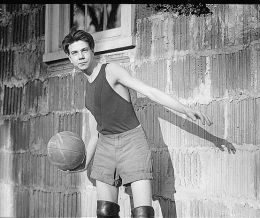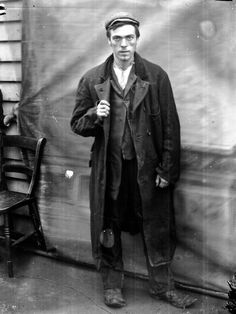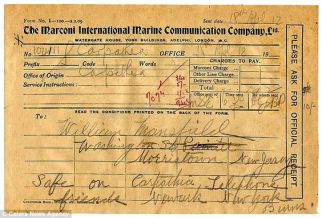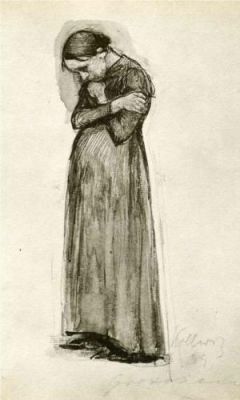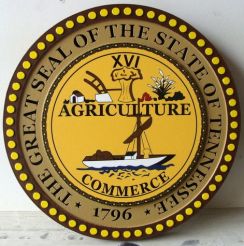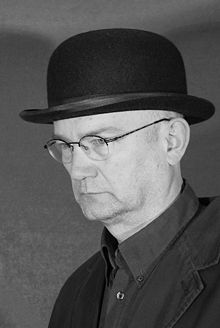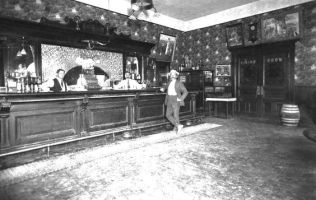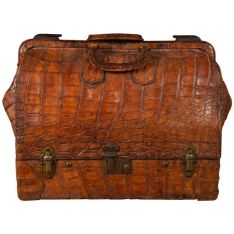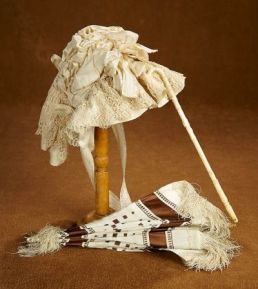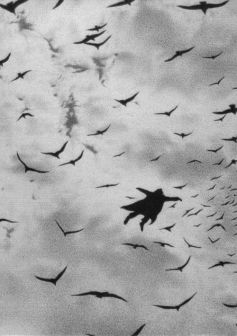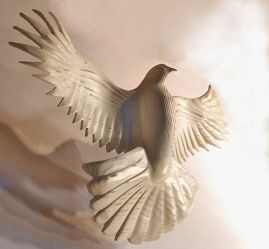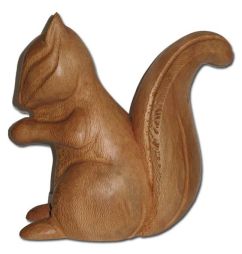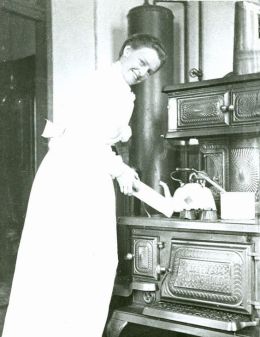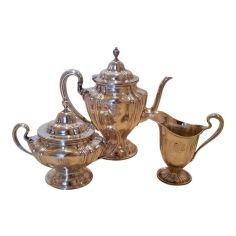Addie drew her head back slowly, slowly, until she could look into Jake’s face. His eyes were closed, and he breathed in soft, sudden puffs. She stood as gingerly as she could and carried him to the bed, careful to step over the squeaking board in the doorway. She reached the side of the bed and leaned over with him, so gradually that the muscles in her back started to complain. She got him onto the mattress and pulled her arm from beneath him, watching his face for any sign of disturbance. Just as she pulled her hand from beneath him, he gave a little whimper. She froze. His eyes never opened. She covered him with the Dutch doll quilt and tiptoed from the room. 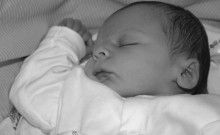
Finally. Jake had been cranky all morning, needing her every second. And naturally, Mary Alice had seen to it that Mama’s attention had to be divided. After a meager lunch of toast and milk, she’d made Mary Alice go to her bed for a nap. But only after nearly two hours of alternated rocking and walking had she been able to get Jake to sleep.
Addie felt like lying down herself. But she was afraid if she stopped moving or doing, she’d fall down in a hole so deep she’d never climb out again. It was hard today; the sadness was on her like a lead–lined overcoat.
She went to the window and pulled aside the curtain. The winter sunlight lay thin on the late afternoon. She let the curtain fall back in place and looked around the parlor. Her eye fell on the Bible her Epworth League class had given her as a wedding gift. It lay on a side table at the end of the horsehair sofa. She went over to the table and picked up the Bible. The binding was still stiff, almost like new. She carried it to the armchair near the window. She sat down and put the Bible on her lap. She thought about trying to pray but decided she lacked the strength to wrestle with the Almighty.
She opened the Bible, spreading the pages out from the center, handling them like fine linen.
And Jeremiah said, The word of the LORD came unto me,
saying, Behold, Hanameel the son of Shallum thine uncle shall
come unto thee, saying, Buy thee my field that is in Anathoth:
for the right of redemption is thine to buy it. So Hanameel mine
uncle’s son came to me in the court of the prison according to the
word of the LORD, and said unto me, Buy my field, I pray thee,
that is in Anathoth, which is in the country of Benjamin: for
the right of inheritance is thine, and the redemption is thine;
buy it for thyself. Then I knew that this was the word of the
LORD. And I bought the field of Hanameel my uncle’s son, that
was in Anathoth, and weighed him the money, even seventeen
shekels of silver …
Her eyes drifted on down the page. She read God’s promise to the imprisoned prophet: his real estate investment was to be a sign that even though Babylon was about to destroy Jerusalem and enslave her people, houses and lands would again one day be bought and sold in Judah. But it sounded like that day was on the far side of a lot of suffering and trouble. 
Addie leaned her head on the back of the chair. She didn’t want Zeb’s money, not really. Come to think of it, he didn’t have anything she wanted. She wanted to be completely free of him. Maybe she didn’t want to leave him with any excuse, any way to take credit for whatever she might do or make of herself. Her children had his name; that was enough. It was more than you could say for the poor child being carried by his paramour.
She guessed she needed to tell Dan Sutherland. As far as she knew, the lawyer was still planning to get everything he could from Zeb. No point in that, as far as she could see.
Of course, that also meant she’d have to do something about her own support that much sooner. The little bit of money Junior had loaned her was about to run out, and she strictly did not want to live off her brothers and sister, however willing they might be to help out.
She pushed herself up out of the chair. Dropping the Bible onto the side table, she wandered back through the house. She arrived at the door to her bedroom. She hadn’t even made up her bed today; the sheets and quilts still lay tangled up, just as she’d crawled out of them this morning. She could see the edge of her new bedspread, draped haphazardly along one side of the bed.
Addie went over to the bed and picked up a corner of the spread. She ran her thumb along the line of the tufting, then bunched the material in her hand. Didn’t seem to be all that much to it. Maybe she ought to go out and talk to the old German woman at Brown’s Ferry, see if she ever needed any piecework. 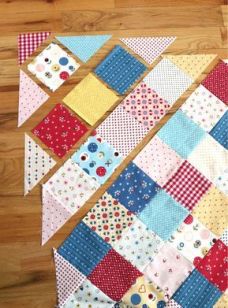
Orange light slanted through the windows. Nearly sunset. Part of her wanted to just let Mary Alice sleep, wanted to go and sit in the parlor and let the house fall dark around her and do pretty close to nothing for as long as she could. But she guessed she’d better try and find something to feed the child, or she’d wake up hungry and scared and twice as hard to manage as before her nap.
Her steps sounded dry and insubstantial, creaking on the floorboards as she walked back toward the kitchen.
*******
Becky smelled him before she saw him. He’d slid off one side of his bed, it looked like; he was crumpled between the bed and the wall. The front of his clothes was sodden, she guessed with his own vomit.
“Lord, help us all,” she said. “Is this what we’ve come to?”
One of his eyes tried to open but couldn’t. “Becky. Oughtta not use … Lord’s name in vain.”
“Oh, is that what you thought I was doing? No, Zeb, I believe that was about as sincere a prayer as I’ve ever said.” She tossed the divorce bill onto his chest and stood over him with her arms crossed.
He fumbled for the papers a second or two before he could grasp them. He held them up and tried to look at them. His head lolled back and he moaned. The arm holding the papers fell limply to one side. “How’d you get hold of this?”
“You’d better not worry about that. That’s the least of your problems, don’t you think?”
“Becky—”
“Zeb, how could you! You lied to me—and to your wife, too, looks like. If my father knew—”
“No! Now, Becky …” He struggled, then pulled himself into a sitting position. He grimaced and grabbed his forehead, like he was afraid it might come off. “Becky, what good’s it gonna do for you to tell Pete?”
“I’m not sure it’ll do any good,” she said. “But if it got you a good horsewhipping, it might be worth it anyway. If I could see that before he turned me out of the house—” The rest of it lodged in her throat. Then the sobs built up enough force to break the jam. She sank down on the foot of the bed and held her face in her hands, and the desolation poured out of her in a sour–tasting flood. “Oh, God. Please, God, help me.” 
In a little while, he got himself onto his feet. Holding on to the wall, he made his way to the washstand. He splashed some water on his face and wiped it on his sleeve. He weaved back toward her and sat heavily on the bed beside her. He tried to take her hand, but she pulled it away.
“I’m not in the habit of holding hands with somebody who smells like puke.”
“Becky, now listen to me. I’ve … I’m sorry. I never meant for you to find out this way.”
“Oh. When were you planning to let me know?”
He kneaded his forehead. “I don’t deserve anything from you but a cussing, I guess.”
She got up and walked across the room, hugging herself. “Zeb, what in the world am I going to do? I’m carrying your child, and that’s bad enough, but I let myself go too far because I loved you, and I thought you loved me. And now I find out—”
“I do! Becky, I do love you, that’s what I want to say. I love you, and … and we’ll work this out. I’ll stand by you, Becky. I will.”
She turned and looked at him. “Like you stood by your wife?”
For awhile he just sat there, staring at the floor. “Becky, I’ve made some bad mistakes. I’ve done some wrong things.” He looked at her. “But loving you wasn’t one of them. Addie, she—”
“That’s her name?”
“She never saw me the way you see me. She never could.” He stood, and for a second, she thought he was going to topple. But he balanced himself, then came toward her. He put out a hand, and for some reason she didn’t understand, she took it.
“Becky, I just need some time to think. There’s a way out of this, I know it. I just have to figure out what it is. I promise, I won’t leave you. I couldn’t.”
She looked at her hand in his. Then she looked into his face. “Well, you better get to thinking, Mr. Douglas. I’m nearly two and a half months gone, and before long I won’t be able to keep our little secret anymore. So you’d best come up with something good, and do it mighty soon.” She pulled her hand from his and walked to the door. “I’ll be waiting to hear,” she said, and then she left.
*******
Mary Alice was squirming again. She wanted to lay her head in Addie’s lap. So, for at least the third time that morning, Addie peeled back her bonnet and Mary Alice lay down. The heels of her shoes clamped loudly on the pew as she stretched her legs.
Then Jake began to fret. He couldn’t be hungry; she’d fed him just before the service started. She jogged him up and down and tried to get him to take the fooler in his mouth, but he just spat it out every time she plugged it in. She blew little puffs of air in his face. That distracted him for a minute; he blinked and tried to see where the strange sensation was coming from.
It was hard to pay any attention at all to J. D.’s sermon, though she was trying. He’d employed a chart today, a tattered sheet tacked onto the wall behind the pulpit. J. D. had his main points daubed onto it with tempera paint. He couldn’t talk his wife out of one of her good sheets, Addie guessed, even if it was for the Lord’s work. 
There was a big red cross painted in the middle of the sheet, representing the cross of Christ. On the left side of the cross were the laws of the Jews, the Old Covenant; and on the right side, the laws of the Church, the New Covenant. It would have been a tedious enough sermon even without the two children to entertain. J. D. cited two or three Scriptures for every law on both sides of the cross. His main point was supposed to be the superiority of the New Covenant over the Old, but Addie was about to get to the place where she’d vote for either one if it would help J. D. to finish what he had to say and let her take herself and these children home.
“Well, brethren, the Lord’s established his New Covenant kingdom, and he’s set its laws in place. They’re good laws, laws meant for our protection. But before we can get the benefit of those laws, we’ve first got to enter that kingdom.
“We’ve got to hear the word and believe it, for faith cometh by hearing—Romans ten, seventeen. We’ve got to repent of our sins and our former ways of life, and confess the name of Jesus before men, for with the mouth confession is made—Romans ten and verse ten. And brethren, we must be baptized for the remission of our sins, ‘For as many of you as have been baptized into Christ have put on Christ’—Galatians three, twenty–seven.”
Getting close to the end for sure, now. As best Addie could tell, there wasn’t a single person in the room old enough to make sense of J. D.’s words who wasn’t already a baptized member of Post Oak Hollow Church. But he had to give his altar call, just the same. You never knew, an unbaptized sinner might’ve slipped in the back door without him knowing it.
The congregation stood to sing the final hymn. Addie roused Mary Alice and got the bonnet back in place, after a fashion. She bounced Jake on her hip until the final chorus slid to a halt and the crowd started to disperse. 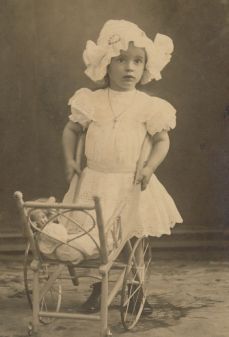
“Good to see you, Addie.”
“Morning, Sister Clay. Good to see you too.”
“That little one there is just growin’ up a storm, isn’t he?”
“Fussing up a storm, anyway.”
Sister Clay grinned and wiggled a forefinger at Jake, who twisted his face away as if he’d been insulted. The old woman patted Mary Alice on the head and gave Addie a final look before moving away down the aisle toward the back door.
That last look was what Addie dreaded—the pitying, pious look. Poor woman, raising those two precious children without a daddy … She knew the thought came from a good place, a well–meaning place. But it was also a constant reminder of things she wished she didn’t have to think about. Things they all knew, too, but would never speak of. Not to her, at least.
The back door was open now. Addie bundled the blankets tighter around Jake and checked to make sure Mary Alice’s coat was buttoned all the way up. She shuffled along the aisle, balancing Jake on her hip with one hand and holding onto Mary Alice with the other.
“Mama, we go Aunt Lou’s?”
“No, honey, not today.”
“Aunt Lou’s.” Mary Alice whimpered. “Go Aunt Lou’s.”
“Sweetheart, not today.”
“Why not?”
“Just because.”
“Go Aunt Lou’s.”
“No.”
Lou and Dub and their boys would be leaving Centenary Methodist about now. They’d visit with the people Addie had known all her life, they’d speak a complimentary word about the sermon to Rev. Stiller at the back door. They’d walk down the tall flight of concrete steps to the sidewalk and have a nice stroll along Georgia Avenue until they came to their street. They’d go in the house and smell the roast or whatever else Lou had baking in the oven for their Sunday dinner.
Every now and then, Addie wondered why she kept on coming out to this dingy little whitewashed clapboard building in the middle of nowhere, Sunday after Sunday, where the people knew her only as the woman Zeb Douglas had left—if they even knew that much about her. Dub and Lou would gladly come out to the house and pick her up. They’d take her and the children with them to church in the lovely old building downtown, then to their house for a delicious lunch Addie wouldn’t have to cook. There would be other sets of arms to hold children, cousins to distract them, a fire already laid in the hearth.
But something reared up stubborn inside her every time she thought about it. Going back to the Methodist church seemed to her like just one more way of admitting she’d been wrong about everything all her life. Well, Zeb’s not around to tell her what to think anymore, so maybe now she’ll come back where she belonged in the first place … It was too easy, somehow—too expected. She wouldn’t let her weight down on it.
And would things really be much different at Centenary Methodist? Wouldn’t she get the same pitying looks? Wouldn’t the same tut–tuts be whispered behind her back? She released Mary Alice’s hand, so she could mind her skirts going down the outside steps.
“Sister Addie, we’re ready whenever you are,” Dink Gilliam said as she turned to help Mary Alice down the steps. His wife and four children were already in the buckboard. Addie was glad; as cool as it was, she hadn’t relished the thought of standing in the churchyard making conversation until her ride was ready to leave.
She handed Jake up to Dink’s oldest daughter and took his hand to make the step up into the wagon. Dink lifted Mary Alice up to her. He climbed in on the other side and the springs complained loudly. “Get up,” he said, and his jug–headed bay leaned into the traces.
“Nice weather, for February,” Maud Gilliam said awhile later as they clattered over the Cellico Creek bridge. Addie smiled and nodded.
“Mama, look at him. He’s smilin’ at me,” said the daughter who was holding Jake. Addie hated to tell her it was probably just a gas spasm. 
“Brother J. D. sure had a good lesson today,” Maud said.
Addie nodded again. She hoped Maud didn’t ask her opinion; she was too brain–tired to be up to the polite fib she’d have to tell.
“Mama, ‘s go Aunt Lou’s,” Mary Alice said, jouncing along in the bed of the buckboard between Addie’s knees.
“No, honey. I already told you.”
“You mind your mother, sugar,” said Maud, giving Mary Alice a fond, admonishing look. “You want to be a sweet little girl, don’t you?”
Mary Alice looked at Maud as if she’d just suggested asparagus for dessert.
“I got me one of those new turfed bedspreads,” Maud said. “Have you seen ‘em?”
Addie shook her head, confused. “Turfed?”
“Yeah, you know—a row of turfing on a smooth background.” Maud gestured in loops and circles.
Tufted, Addie guessed. “Oh, yes, I got one for Christmas from my sister.”
Maud looked a little disappointed. “I found it up by Brown’s Ferry.”
“The German woman?”
Maud nodded. “Land, she’s sure got the business. The day I was there, they was two in line ahead of me and more comin’ behind. These turfed spreads are all the fashion nowadays. Wished I’d of thought it up.”
“I guess so. I sure like mine.”
“Me too.”
Addie was relieved to see her lane coming up. Dink hauled up in front of her porch and got off to help them down. He set Mary Alice on the ground and handed Addie down. She turned and took Jake from the daughter.
“I wish I could keep him all the time. He’s so sweet,” the girl said.
Addie smiled up at her. “You’d get tired of him pretty quick, honey.”
“But he’s so sweet.”
“Well. Thanks for holding him.”
“Need me to do anything ‘fore we leave, Sister Addie?”
“No, thank you, Dink. We’re fine.”
Dink climbed back in the wagon. He slapped the reins lightly on the bay’s rump, and they trundled off. “Come home with us some Sunday; I’ll show you my bedspread,” Maud called as they pulled away.
Addie smiled and nodded. She waved, then turned toward the house. “Come on, Mary Alice, let’s get inside. It’s cool out.”
*******
This post is a chapter from the novel Sunday Clothes, by Thom Lemmons. Sunday Clothes will soon be available for purchase as an e-book at www.homingpigeonpublishing.com
![]()
So Fair and Bright (a weblog) by Thom Lemmons is licensed under a Creative Commons Attribution-Noncommercial-No Derivative Works 3.0 United States License.
